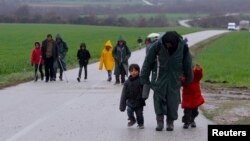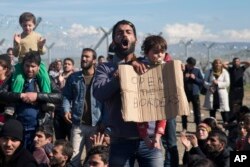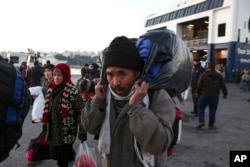European Union leaders begin talks Thursday to work out a migrant deal with Turkey that is littered with political, legal and logistical stumbling blocks, leaving the path ahead far from certain.
With thousands of migrants stuck in the mud and rain in Greece, and tens of thousands more expected to arrive in the coming months, the 28-member bloc is facing mounting pressure to close its bickering ranks and come up with a coherent plan for dealing with them during the two-day meeting in Brussels.
But prospects of finalizing an agreement appear to be fading. Analyst Camino Mortera-Martinez is betting against it.
"I think the opposition among member states is growing, and it's going to be very difficult to justify and craft a deal in such a short time frame," says Mortera-Martinez, a research fellow at the London-based Centre for European Reform.
Even if a deal is reached, she added, "there are many practical problems in implementing it."
Draft agreement
Under a draft agreement reached with Turkey earlier this month, Ankara would take back all undocumented migrants crossing from Turkey to Greece. For its part, the EU would accept one Syrian refugee from Turkey for every Syrian it sends back.
In return, the EU would accelerate long-stalled membership talks with Turkey, speed up and potentially increase migrant aid to Ankara, and offer visa-free travel for Turkish citizens as early as June, providing Turkey meets a series of conditions.
"What is at stake ... is whether we can get a deal that, for the first time, gives us a chance to get a sustainable, pan-European solution to the refugee issue," said German Chancellor Angela Merkel, who was central in cobbling the draft deal and whose country has taken in the lion's share of asylum-seekers.
Also adding pressure is the situation in Greece, where roughly 43,000 migrants are holed up in increasingly squalid conditions after Macedonia and other Balkan nations erected barriers to cut off the main migration route to Germany.
Roughly 1 million migrants arrived in Europe last year, and more than 150,000 have arrived this year by sea, according to the International Organization for Migration — a number expected to escalate as the weather warms up. The numbers amount to Europe's biggest migrant crisis since World War II.
‘Unacceptable’
Spain has called the deal with Turkey, as originally drafted, "unacceptable" and in violation of EU and international law. Meanwhile, EU member Cyprus says Turkey must fulfill obligations that include recognizing the Cypriot government.
In Geneva, the U.N.'s human rights chief Tuesday suggested that expelling asylum-seekers en masse to Turkey is illegal, and called on Ankara to fully embrace the Geneva Conventions rules on refugee rights. Right now, Turkey grants temporary protection to refugees from Syria, but not other nationalities.
"We would rather see that full protections are provided," the U.N. High Commissioner for Human Rights, Zeid Ra'ad Al Hussein, told Reuters, adding that Turkey should also care for those who do not qualify as refugees but still need protection.
On the eve of the summit, the EU's executive arm set out six principles for any deal with Turkey that would respect international law, including legal safeguards for the return of all migrants whose protection needs would be treated on a case-by-case basis.
But rights group Amnesty International remained skeptical of the announcement, calling for a deal that is "genuinely meaningful rather than a cosmetic change."
"In reality, the essence of the deal has not changed," Amnesty's Europe Director John Dalhuisen said. "These fig leaf procedures won't hide Europe's guilty conscience if large scale returns of refugees start happening now."
‘Overwhelmed’
Analyst Mortera-Martinez also points to practical hurdles, including the difficulty of individually treating the cases of thousands of migrants stranded in Greece.
"They are trying to do is to speed up the process of reviewing each individual application in a speedy manner," she says, "but in practice that is going to be very complicated, because Greece is not efficient in processing people, because it is overwhelmed."
With the Balkans route from Greece closed, migrants are looking for other ways of entering Europe. Italy's coast guard announced Wednesday it had picked up nearly 2,000 migrants off the coast of Libya since the day before. In a letter to European foreign ministers, EU foreign policy chief Federica Mogherini warned the chaos in Libya could mean nearly a half-million asylum-seekers who "could be candidates for migration to Europe," Politico reported.
"If people see the Turkish route is no longer efficient they may turn to other routes," Mortera-Martines said, including dangerous crossings from Libya. "And it basically means moving the problem from Greece to Italy and Malta."
In the absence of an agreement with Turkey, she believes the EU's migrant policy will continue as it has been: piecemeal.






